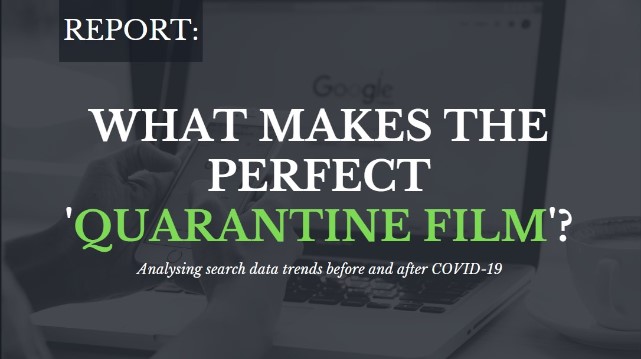What makes a great 'quarantine film'? Analysing film search trends after COVID-19

With everyone now spending so much of their time inside, we’ve been watching movies much more as a society. We have always sought certain genres for a cheap thrill or a belly laugh, but now it seems we’re turning to Netflix and Amazon Prime in much higher numbers for something more substantial - sanity. The numbers show it, too.
On April 21st, Netflix reported an increase of 15.8 million subscribers over a recent period, far ahead of the 7.6 million Wall Street predicted (Source: LA Times).
Compared to the same period last year, this has seen both their net income ($709 million) and their earnings per share ($1.57) more than double.
In comparing year-on-year data, we can accurately gauge the impact COVID-19 has had. With that in mind, we investigated the very movies, celebrities and genres we’ve been seeking refuge in to see how their public interest levels have changed. To do this, we compared the search volume data for the first full month of wide-scale quarantine (April 2020), to the same period a year prior (April 2019). You’ll find that across the board, searches are on the rise because people are watching more films than ever - this is why we’ll find the most interesting data when comparing searches.
This data allows us to see what we as a society looked for in the oft-mentioned ‘quarantine movie’. Are we turning to comedies for solace or disaster movies to almost help us come to terms with the world around us? Will we see a rise in films like 28 Days Later, which portray large metropolitan areas empty of people, out of a grimly ironic search for relatability? Maybe everyone still just wants to watch The Lion King.
The most interesting takeaways:
- Searches for “best fantasy movies” have increased by 125%, while searches for "best horror movies" have only increased by 82%. Are people seeking solace in the rolling hills and stunning landscapes of films like Lord of the Rings over the bloody dungeons of horror movies like Hostel?
- Searches for “sad movies” have increased by 124%, while searches for “happy movies” have only increased by 81%. Does this show that people want to wallow in anxiety instead of trying to find ways to combat it?
- Searches for the actor “Tom Hanks movies” have surged by 234%. Did people fear losing Tom Hanks after his brush with COVID-19 and search to find his best movies to watch and remind themselves of how talented he is?
- Searches for the film “Groundhog Day” have shot up by a staggering 811%. Are people relating to a film where every day looks exactly the same; a sentiment that is common amongst people at the moment?
- Searches for “Call Me By Your Name” have increased by 307%. Do people want to watch films filmed in beautiful areas like Northern Italy to help them deal with being stuck in their houses all day?
Below, you can find the data we've collected, along with the methodology and further notes at the bottom.
Which movie genres are getting searched for more?
What emotions are we looking for from our movies?
Which directors are we seeking out more?
Which actors do we want to watch more?
Which actresses do we want to watch more?
Which classics are we returning to?
- IMDb Top 5 Movies
- Disney movies
- Horror movies
- Comedy movies
- Romantic movies
Methodology and further notes:
We used the SEO Monitor ‘Search Trends after COVID-19’ tool to collect all of the data above, with the United Kingdom region selected. Their search volumes are taken from Google Ads’ Keyword Planner, using their own variations of the aggregation system.
Topics were picked based on our own personal knowledge of the industry, what people would be interested in and search strings on Google. For example, when deciding which actors we would cover, we searched “most popular actors” so we could source the data that people would be most interested in. By this, we mean that the public is going to be considerably more interested in the data surrounding an actor like Tom Hanks, than a lesser-known actor like Iko Uwais.
All data and information are accurate as of June 2020.









